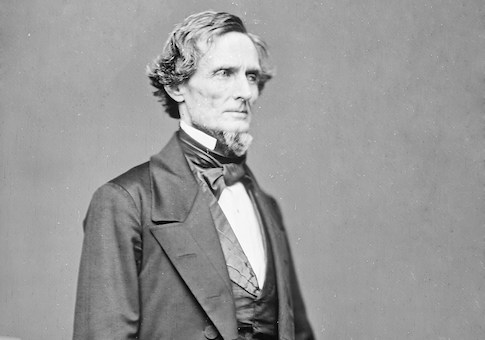On the face of it, Jefferson Davis had the ideal resume for service as the Confederacy’s first chief executive. In addition to serving as one of Mississippi’s Senators, he had served as a West Point trained officer in the U.S. regular army, had commanded a volunteer regiment during the Mexican War, and had served as one of the antebellum period’s most capable and reform-minded Secretaries of War. His prior experience certainly appeared superior to Lincoln, who could claim no noteworthy military or executive experience before his election to the presidency. Nevertheless, it was Lincoln who led the Union to victory and presided over Emancipation, while his Confederate adversary superintended a catastrophic defeat.
James McPherson’s Embattled Rebel is a capable study of Davis as a wartime leader, and illustrates how even presidents not subject to reelection remain constrained by structural factors such as public opinion and economic capacity. It also illustrates how such constraints do not nullify a president’s responsibility for crucial managerial tasks such as selecting senior civilian and military leaders. Both Lincoln and Davis exercised extraordinary wartime powers to mobilize their nations for the most intense of all American conflicts, and both faced domestic opponents who accused them of wielding dictatorial powers.
In contrast to Lincoln, historians have generally been unkind to the notoriously cantankerous Davis, who has always faced an unkind, if inevitable, comparison with his Union rival. David Morris Potter (perhaps the greatest historian of the American South of his generation) went as far as to claim that "if the Union and Confederacy had exchanged presidents with one another, the Confederacy might have won its independence." McPherson convincingly overturns this view of Davis as a prime cause for the Confederacy’s defeat, while recognizing Davis’ very real flaws, especially those related to his tendency to allow personal relationships and prejudices to determine important personnel decisions.
McPherson, like most military historians of the Civil War, finds Davis’ strategic decisions reasonable in light of the political and material constraints he faced. His much-criticized early war strategy of defending the Confederacy’s entire border overstretched the new nation’s resources, but Davis could not ignore domestic political pressure to defend every inch of Confederate territory.
Davis’ alternative offensive defensive strategy adopted after the collapse of the Confederacy’s initial defensive cordon hoped to concentrate its scarce resources at specific strategic points in order to enable victories on Northern soil that would crush Union morale. In McPherson’s view, when executed by Lee, this strategy came reasonably close to success during the fall of 1862 and the summer of 1863. However, during both of these pivot points, Robert E. Lee could not obtain a decisive victory on Northern soil to crush Union morale.
Lincoln and Grant thus won the war through their effective mobilization of Union resources, as opposed to Davis losing it by using an unreasonable or implausible strategy.
Nevertheless, McPherson also illustrates Davis’ failures as a manager, especially in his selection and management of senior civilian and military leaders. In addition to a tendency toward micromanagement, Davis stood by former associates and friends who he appointed to positions of responsibility, long after they demonstrated their incapacity. Most seriously, Davis then exacerbated this managerial flaw by failing to resolve expeditiously the tortured leadership crisis in the Confederate Army of Tennessee, where commanding general Braxton Bragg feuded with his senior corps commanders, including Leonidas Polk, a personal pet of Davis notable for being both an Episcopalian Bishop and an inept military leader.
Instead of either choosing between Bragg and his factional opponents, Davis allowed both to poison the Army of Tennessee’s command structure until the Confederate catastrophe at Missionary Ride in November 1863 forced Davis to relieve Bragg.
McPherson rightly points out that Davis cannot bear complete responsibility for the Confederacy’s inability to find a western field army commander equal to Lee in competence. The Confederacy went to war with the senior generals it had, as opposed to the ones it desired. While McPherson is especially hard on Joseph Johnston, Davis as his superior bears a heavy burden of responsibility for his own stubborn unwillingness to soothe Johnston’s colossal ego.
After all, Lincoln also struggled with his own generals, but in the end, unlike Davis, he found a way to find the army commanders he needed to guide the Union to victory. In addition to a ready willingness to sack failed commanders, Lincoln also proved far more capable of managing the touchy egos of his own generals than Davis. Such egotists as McClellan and Hooker failed in the end, but only after Lincoln gave them a fair opportunity to succeed militarily, while unburdened by petty personality conflicts with civilian superiors. The same cannot be said of the fraught relationship between Davis and Johnston.
The American Civil War should remind current and future presidents that they—in the 19th century as in the present day—remain both tribunes of the people and managers of a bureaucracy, responsible not only for setting out a larger vision for a beneficent American future, but for also selecting and coordinating the senior officials responsible for making that vision a reality on the ground. In an era where security threats such as terrorism remain persistent, presidents still bear the burden of selecting and superintending capable military leaders, both in and out of uniform. Lasting presidential success requires managerial skills above and beyond prowess on the campaign trail.
